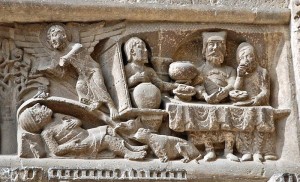“God is able to make all grace abound to you, so that in all things at all times, having all that you need, you will abound in every good work… You will be made rich in every way so that you can be generous on every occasion.” ~2 Corinthians 9:8-11
 The foundation of our Christian giving is knowing that God is the giver of all things. It’s a very radical thing to declare that God — not me, God! — is responsible for everything I have and everything I am. It’s huge. It’s an insight that is so simple, yet profoundly life-changing. Once you grasp the truth that everything you own, everything you have decisions over, comes from God, your whole outlook and lifestyle change.
The foundation of our Christian giving is knowing that God is the giver of all things. It’s a very radical thing to declare that God — not me, God! — is responsible for everything I have and everything I am. It’s huge. It’s an insight that is so simple, yet profoundly life-changing. Once you grasp the truth that everything you own, everything you have decisions over, comes from God, your whole outlook and lifestyle change.
It’s not that we care less about our possessions; it’s that we care much more about God’s purposes in giving us all these possessions in the first place which, ironically, is to give them away for the benefit of others.
Generous, over-the-top giving demonstrates our continuing confidence that God is always going to give us everything we need. Giving away our money is an act of dependence on God. To withhold our money or to give it grudgingly or with hesitation betrays an insecurity that denies the very thing Scripture’s talking about in 2 Corinthians 8-9.
We’ll justify conservative giving, though. Well throw big words at stingy giving to make it sound better. “Stewardship.” We’ve got to be “good stewards” with God’s money. Usually when people say “stewardship” — and I’m talking about individual Christians and church leadership groups — they’re talking about not spending the money or saving the money or holding the money. I don’t know how that became the Church’s idea of stewardship when the Bible’s idea of stewardship is to give everything away and trust in God.
The fact that Christians ask all the time how much they should give, how much they have to give, how much they’re supposed to give, tells me we don’t get it yet. An amount is not the Bible’s point. The point is that our giving flows from a grateful attitude toward God and a faithful dependence on God. The underlying assumption in Scripture, the principle that undergirds everything, is that all of God’s people give as much money as they can to help as many people as they can to give God as much glory as they can. The only rule is to give freely and generously as an expression of thanksgiving and trust.
Peace,
Allan





Recent Comments